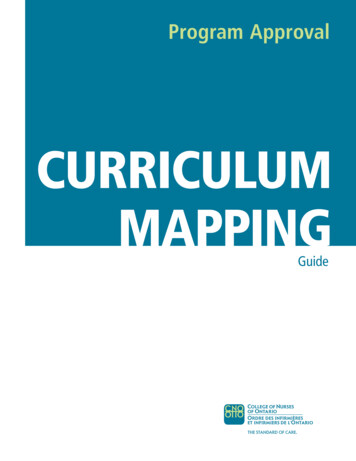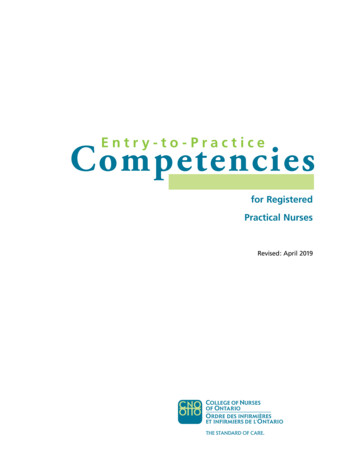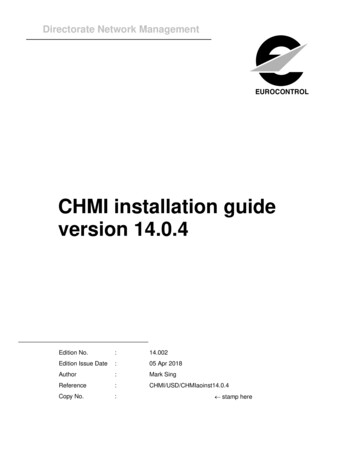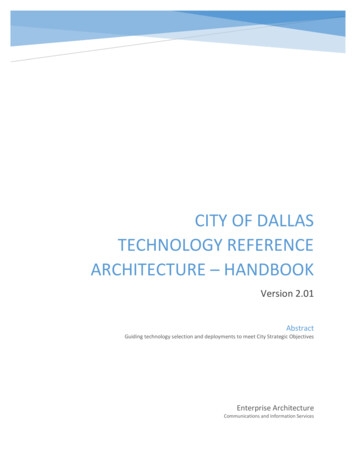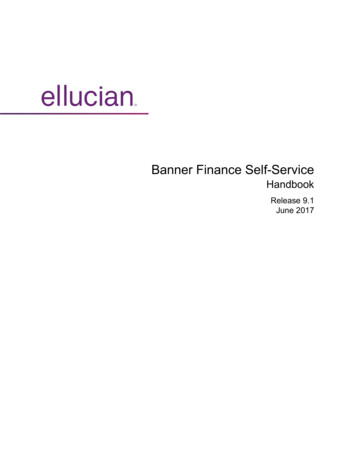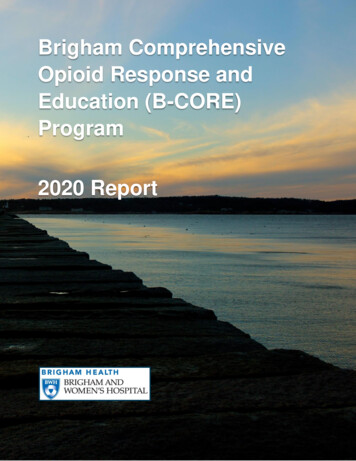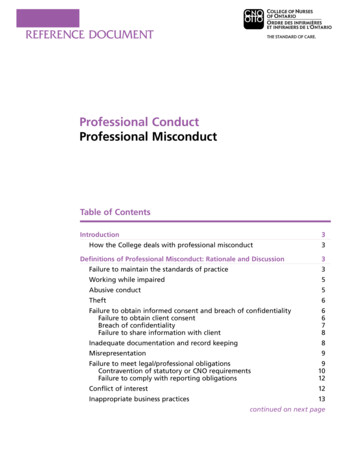
Transcription
REFERENCE DOCUMENTProfessional ConductProfessional MisconductTable of ContentsIntroduction3How the College deals with professional misconductDefinitions of Professional Misconduct: Rationale and Discussion33Failure to maintain the standards of practice3Working while impaired5Abusive conduct5Theft6Failure to obtain informed consent and breach of confidentialityFailure to obtain client consentBreach of confidentialityFailure to share information with client6678Inadequate documentation and record keeping8Misrepresentation9Failure to meet legal/professional obligationsContravention of statutory or CNO requirementsFailure to comply with reporting obligations91012Conflict of interest12Inappropriate business practices13continued on next page
Table of ContentscontinuedDisgraceful, dishonourable and unprofessional conduct15Other grounds for professional misconductGuilty of an offenceFinding of professional misconduct in another jurisdictionSexual abuse15151616OUR VISION Leading in regulatory excellence.OUR MISSION Regulating nursing in the public interestProfessional MisconductPub. No. 42007ISBN 978-1-77116-119-0Copyright College of Nurses of Ontario, 2019.Commercial or for-profit redistribution of this document in part or in whole is prohibited except with the written consent of CNO. Thisdocument may be reproduced in part or in whole for personal or educational use without permission, provided that: Due diligence is exercised in ensuring the accuracy of the materials reproduced; CNO is identified as the source; and The reproduction is not represented as an official version of the materials reproduced, nor as having been made in affiliation with,or with the endorsement of, CNO.First Published June 1999 as Explanation of Professional Misconduct (ISBN 0-921127-94-4)Reprinted January 2000, October 2000, Revised for Web June 2003, Reprinted January 2004, December 2005, May 2008. Updated Jan 2012 forRegistration Regulation changes. Updated 2014 for Dispensing (ISBN 978-1-77116-084-1). Updated for Bill 87, Protecting Patients Act, 2016.Updated July 2018 for pseudonyms and register suppression requests.Updated April 2019 for references to Child, Youth and Family Services Act, 2017.Additional copies of this booklet may be obtained by contacting CNO’s Customer Service Centre at 416 928-0900or toll-free in Canada at 1 800 387-5526.College of Nurses of Ontario101 Davenport Rd.Toronto, ON M5R 3P1www.cno.orgCe fascicule existe en français sous le titre : La faute professionnelle, n 52007
REFERENCE DOCUMENTIntroductionNursing is a self-regulating profession. This meansthat the government has delegated to the professionthe authority to regulate itself for the purpose ofprotecting the public.In Ontario, under the authority of the RegulatedHealth Professions Act, 1991, (RHPA) and theNursing Act, 1991, the College of Nurses of Ontario(CNO) regulates the practice of nursing to protectthe public interest. The Ontario Regulation 799/93,hereafter referred to as the Regulation, arises fromthese Acts and defines professional misconduct forRegistered Nurses (RNs) and Registered PracticalNurses (RPNs).As part of its self-regulating role, the College setsand enforces standards of practice to which nursesmust adhere in order to provide the public withsafe, effective and ethical nursing care. Professionalmisconduct is an act or omission that is in breach ofthese accepted ethical and professional standards ofconduct.The Regulation lists the recognized types ofprofessional misconduct. It is based on a generalframework provided by the Ministry of Health andLong-Term Care and is consistent with professionalmisconduct provisions for other health professionsregulated by the RHPA.Acts that constitute a breach or abuse of the nurseclient relationship are considered professionalmisconduct, as is conduct that demonstrates a lackof integrity. In other words, a nurse’s conduct that isharmful in any way, or that undermines or detractsfrom the professional caring relationship withand for the client, is not consistent with expectedprofessional standards.Although the provisions of the Regulation providesome guidance, nurses need to use judgment atall times in assessing what would be professionalmisconduct. Ultimately, it is a nurse’s ownresponsibility to know what does and does notconstitute professional conduct and misconduct.How the College deals with professionalmisconductActs of professional misconduct may resultin an investigation by the College, followedby disciplinary proceedings. As set out in thelegislation, the College investigates all complaintsabout nurses. The College also receives mandatoryreports of termination of nurses from employers.When the information reported discloses reasonableand probable grounds to believe that the nurse hascommitted an act of professional misconduct or isincompetent, the executive director may initiate aninvestigation.Definitions of ProfessionalMisconduct: Rationale and DiscussionThe definitions of professional misconduct foundin the RPHA are given below. To assist nurses inunderstanding the types of conduct that are definedas professional misconduct, the regulatory clauses(in bold) have been grouped under headings, andexplanations have been provided.Failure to maintain the standards ofpracticeNurses are expected to adhere to the standardsof practice in carrying out their professionalresponsibilities. These standards are the reasonableexpectations placed on nurses by the College andby the profession to ensure that nurses provideresponsible, safe and adequate care to clients.Professional misconduct occurs when thesestandards are breached.1. Contravening a standard of practice of theprofession or failing to meet the standard ofpractice of the profession.DiscussionCNO’s standards of practice consist of three keycomponents: professional standards, practiceexpectations, and legislation and regulations. Nursesare accountable for practising in accordance withthese standards. All standards of practice:provide a guide to the knowledge, skills,judgment and attitudes that are needed to practisesafely; College of Nurses of Ontario Professional Conduct: Professional Misconduct3
4REFERENCE DOCUMENT describe what each nurse is accountable andresponsible for in practice;represent performance criteria against whichall nurses may be compared by consumers,employers, colleagues and themselves; andinterpret nursing’s scope of practice to the publicand other health care professionals.A complete list of CNO standards of practicedocuments can be obtained from the College.If a standard of care is not specifically addressedin College documents, the standard of care isdrawn from nursing theory, clinical experience, andresearch and nursing literature, as well as relevantCollege standards.The following clauses identify breaches of specificstandards of practice.2. Delegating a controlled act set out insubsection 27(2) of the Regulated HealthProfessions Act, in contravention of Section 5of the Nursing Act.DiscussionAs part of the duty to ensure client safety, thenurse must ensure that she/he has the necessaryknowledge, skill and judgment to provide nursingcare in her/his area of practice.Delegation is the transfer of authority to a personwho is otherwise not authorized to performa procedure within one of the controlled actsauthorized to nursing. The person may be amember of another profession regulated under theRHPA, a member of a profession not regulatedunder the RHPA or a member of the public.For more information about delegation of controlledacts, see Authorizing Mechanisms.3. Directing a member, student or other healthcare team member to perform nursingfunctions for which he/she is not adequatelytrained or that he/she is not competent toperform.College of Nurses of Ontario Professional Conduct: Professional MisconductDiscussionNurses may be placed in situations in which theyare expected to direct others to perform acts forwhich these individuals do not have the necessaryknowledge, skill and judgment. This carries thepotential for jeopardizing client safety. Whendirecting another individual to perform an act, anurse remains accountable for ensuring that theperson whom she/he directs and supervises hasthe knowledge, skill and judgment to performthe functions competently and safely. For moreinformation about the accountability of nursesin relation to teaching, delegating, assigning andsupervising unregulated care providers, see Workingwith Unregulated Care Providers. The College’spractice guideline Supporting Learners explains theaccountability of nurses in settings where nursingstudents obtain practical experience providing clientcare.4. Failing to inform the member’s employerof the member’s inability to accept specificresponsibility in areas where specific trainingis required or where the member is notcompetent to function without supervision.DiscussionTo ensure that standards of practice are maintained,a nurse must recognize and acknowledge thelimitations in her/his knowledge, skill andjudgment. The nurse cannot assume duties andresponsibilities unless she/he is able to perform themin a safe and skilled manner. The nurse shoulddiscuss her/his professional limitations with theemployer, identify those areas of practice that she/heis competent to carry out and those areas in whichshe/he needs additional education, experience orsupervision. The nurse is also expected to assist theemployer in identifying other individuals who maybe competent to carry out the task that the nursecannot perform without training or assistance, or tosuggest any other available resources.5. Discontinuing professional services that areneeded unless:the client requests discontinuation;alternative or replacement services arearranged; or
REFERENCE DOCUMENT the client is given a reasonable opportunity toarrange alternative or replacement services.DiscussionThis clause addresses the issue of abandoningclients. Nurses are expected to provide safe, effectiveand ethical care. Because of their commitment toclients, nurses act in the best interests of clientsaccording to the clients’ wishes and the nursingstandards of practice. Consequently, nurses maynot abandon or neglect clients to whom they havemade a commitment to provide care. For example,a nurse who provides care in the community shouldnotify her/his employer if she/he is unable to makescheduled visits to clients in their homes to enablealternative arrangements to be made.In some circumstances, nurses may wish towithdraw from providing care because theirpersonal values are in conflict with clients’ decisionsabout care or treatment. Nurses are advised toclarify their personal values before acceptingemployment in practice settings where the types ofcare provided may create an ethical dilemma for thenurse. For example, a nurse employed in a practicesetting that provides birth control counselling andservices for women may experience a conflict ofvalues when the client is a very young teen. In thissituation, the nurse may need to make arrangementsfor another nurse to provide the required nursingcare. If no other caregiver can be arranged, thenurse must provide the immediate care required.In situations in which nurses have contracted withclients to provide care or services, the nurse mustcontinue to provide care for the safety and well being of the client, except when the client requeststhat the service be discontinued, the nurse arrangesfor alternative or replacement services, or the nursenotifies the client that service will be discontinuedand the client is given reasonable opportunityto arrange alternative or replacement services.For more information, see the College’s practiceguideline Refusing Assignments and DiscontinuingNursing Services.Working while impairedMood-altering substances can impair the judgmentand ability of nurses and jeopardize client andpublic safety.6. Practising the profession while the member’sability to do so is impaired by any substance.DiscussionNurses have a commitment to clients to practisesafely. Clients trust that they will not be exposedto health care providers whose abilities may beimpaired by drugs or alcohol. It is the professionalobligation of the nurse whose judgment may beimpaired by mood-altering substances to withdrawfrom client care to ensure that client safety is notjeopardized. Nurses suffering from substance abuseneed to seek help.Though not included in this subsection, clause25 of the Regulation makes it incumbent uponnurses to report to the appropriate authority theimpairment of another nurse or health care providerwho is providing client care, to prevent harmto clients and ensure that the standards of theprofession are maintained.Abusive conductAny abusive conduct by a nurse toward aclient is inconsistent with the fundamentalprofessional obligations of the nurse. Such conductis not tolerated by the public, the College or theprofession.7. Abusing a client verbally, physically oremotionally.DiscussionAbusive conduct is interpreted broadly to includeacts or omissions that cause or may cause physicalor emotional harm to a client. Abusive conduct mayconsist of physical, non-physical, verbal or non verbal behaviour toward a client; it includes neglectand conduct that may be reasonably perceived bythe client or others to be of a sexual or otherwisedemeaning, exploitative, derogatory or humiliatingnature. Such behaviour or remarks include, butCollege of Nurses of Ontario Professional Conduct: Professional Misconduct5
6REFERENCE DOCUMENTare not limited to, sarcasm, swearing, racial slurs,teasing and the use of an inappropriate tone ofvoice. In addition, the nurse must not behave in amanner that demonstrates disrespect for the client,and that is perceived by the client and others to beemotionally abusive. Such behaviour includes, butis not limited to, sarcasm, retaliation, intimidation,manipulation, teasing or taunting, insensitivity tothe client’s culture and insensitivity to the client’spreferences with respect to sexual orientation andfamily dynamics.TheftTrust is one of the cornerstones of the nurse-clientrelationship. Honesty is an essential ingredient inensuring that client trust is maintained and thatthe client’s vulnerable position is not abused by thenurse. In addition, nurses are in a position of trustwith their employer. It is important that nurses notabuse this trust.The use of excessive force or inappropriate physicalconduct amounts to physical abuse and constitutesan abuse of authority and power over the client. Anurse must not exhibit behaviour toward a clientthat may be perceived by the client or others to beviolent or to inflict physical harm. Examples of suchbehaviour include, but are not limited to, hitting,pushing, slapping, shaking, using force, usingrestraints unnecessarily or inappropriately, andhandling a client in a rough manner.DiscussionNurses have an obligation to maintaincommitments that they acquire as regulated healthprofessionals. This means keeping promises, beinghonest and meeting implicit or explicit obligationstoward their clients, their employers and others.Dishonesty will destroy the nurse-client relationshipregardless of the level of knowledge, skill andjudgment of the nurse. Theft from an employerand, in particular, misappropriation of drugs, isa frequent subject of discipline hearings. Nursesusually have access to drugs, equipment andsupplies in their workplace, but must not abusetheir position simply because the property is readilyaccessible or available. Misappropriating any type ofproperty in general, and from clients in particular,will not be tolerated. It undermines the trustrelationship that the client and employer have withthe nurse.Failure to meet the basic needs of clients who areunable to meet these needs themselves is consideredneglect. Neglect is considered abuse and includes,but is not limited to, the withholding of carenecessities such as food, medication and needed aidsor equipment.It is important to note that the definition of abusiveconduct does not require that a nurse has an intentto harm the client. When the actions of a nurse areabusive, whether or not she/he intended them to beso, the conduct is still considered abusive.For a more detailed discussion of abuse, refer tothe College’s Therapeutic Nurse-Client Relationshippractice standard.Although not addressed in this subsection, it is theresponsibility of all nurses to intervene to preventor stop abusive behaviour of a client by a nurse oranother health care provider, and to report suchincidents to either her/his employers, the Collegeor an appropriate authority. A discussion of whatconsititutes an “appropriate authority” is discussedin clause 25.College of Nurses of Ontario Professional Conduct: Professional Misconduct8. Misappropriating property from a client orworkplace.Failure to obtain informed consent andbreach of confidentialityClients are entitled to make decisions regardingtheir health. Nurses must respect and advance aclient’s right to make his/her own decisions, whichshould be based on an understanding of the besthealth information available. Health information isconfidential and, except in specified circumstances,must not be disclosed without the consent of theindividual client.Failure to obtain client consent9. Doing anything to a client for a therapeutic,preventive, palliative, diagnostic, cosmeticor other health-related purpose in a situation
REFERENCE DOCUMENTin which consent is required by law, withoutsuch a consent.DiscussionThis provision highlights the principle of clientchoice and the requirement for informed consentto treatment. Client consent is required for nursingcare; it is not limited to medical interventionsperformed by physicians.Obtaining consent from clients must be inaccordance with current legislation. The College’sdocument Consent provides an overview of therelevant legislation and outlines the steps toobtaining client consent.If the client is not capable of making the treatmentdecision, consent must be obtained from thesubstitute decision-maker.A client is capable of making a treatment decisionif he/she is able to understand the information thatis relevant to making a decision concerning thetreatment and is able to appreciate the reasonablypossible consequences of a decision or lack ofdecision. There is no age threshold — the questionis whether a specific client is capable of making adecision at a specific time about a specific treatmentproposal.For a client to give informed consent, he/she mustbe given information that a reasonable person inthe same circumstances would require to make adecision about the treatment, alternative courses ofaction, the expected effects, risks and side effectsin each case, and the consequences of not havingthe treatment. Also, the client’s questions about theproposed treatment must be answered.Consent is best obtained by the person proposingthe treatment because that person has theknowledge and judgment relevant to the proposedprocedure and the individual client.Consent can be written or oral, expressed orimplied. Consent must be given voluntarily and canbe withdrawn at any time.The only time that informed consent is not requiredis in a clinical emergency, when the client isincapable of making a treatment decision and thereis insufficient time to ask the substitute decisionmaker. Emergency treatment cannot proceed,however, if the health care practitioner is aware thatthe client expressed a wish while capable to refuse orwithdraw consent to treatment.Breach of confidentiality10. Giving information about a client to a personother than the client or his/her authorizedrepresentative except with the consent of theclient or his/her authorized representative oras required or allowedby law.DiscussionClient health information is held in confidence byhealth professionals. Disclosure of this informationcan occur only with the consent of the client orthe client’s representative, or when authorized bylaw. This requirement does not, however, restrictthe ability of the nurse to contact other health careprofessionals to ensure continuity of client care andenable the nurse to carry out client care within amultidisciplinary setting.The duty to keep client information confidential isnot restricted to health information. It relates to anyclient information obtained as part of the nursingrelationship. The duty of confidentiality outlives theprofessional relationship and continues indefinitelyafter the nurse has ceased to care for the client. Theduty may not apply to information that is in thepublic knowledge or domain, but a nurse shouldguard against participating in, or commentingon, speculation concerning the client’s health.Such speculation could not only be perceived asa breach of the client’s confidence, but may alsounintentionally escalate into actual unauthorizeddisclosure.In some instances, nurses learn information that, ifnot revealed, will result in serious harm to the clientor another person or persons. In such situations,nurses need to consult with the health team andCollege of Nurses of Ontario Professional Conduct: Professional Misconduct7
8REFERENCE DOCUMENTwith a legal adviser and, if appropriate, reportthe information to the person or the institutionconcerned. In most circumstances, the client orthe substitute decision-maker should be told of theneed to disclose the information and be given theopportunity to take action. Some legislation, forexample, the Child, Youth and Family Services Act,2017, also requires that nurses reveal confidentialinformation to others. For more information, referto the Confidentiality and Privacy — Personal HealthInformation practice standard.The Documentation and Ethics practice standardscontain additional information regardingconfidentiality.Failure to share information with client11. Failing to reveal the exact nature of a secretremedy or treatment used by the memberfollowing a client’s request to do so.DiscussionClients are entitled to know the precise nature ofany secret remedy or treatment used by the nurseto treat the client. Clients need information abouttheir treatments or proposed treatments to makeappropriate and informed health care decisions.Secret information needs to be revealed to the clientfor the nurse to obtain informed consent from theclient.12. Failing to advise the client to obtain servicesfrom another health professional when amember knows or ought to know that a clienthas a condition that is outside the member’sscope of practice, or within the member’sscope of practice but outside the member’scompetence to treat.DiscussionNurses must ensure that their ability to providenursing care to clients is consistent with the clients’needs. A nurse has the responsibility to direct aclient to another health care provider when thenurse is unable to adequately meet the healthcare needs of the client. Nurses with independentpractices have a particular responsibility to directCollege of Nurses of Ontario Professional Conduct: Professional Misconductclients to other health care providers when theycannot adequately meet the client’s health careneeds.Inadequate documentation and recordkeepingAccurate and adequate health records must becreated and maintained as an integral part ofthe services provided by nurses to clients. Healthrecords are the means by which informationabout the client is communicated and continuityof care is maintained. Records also demonstratenurses’ accountability and answer questions aboutthe care given. Records may also be used as riskmanagement tools and for research purposes.The College’s practice standard Documentationprovides a complete outline of the expectations forrecord keeping.13. Failing to keep records as required.DiscussionClients have the right to expect that accurate andadequate records about their health care are keptby their health care practitioners. This ensures thatcare requirements are communicated to others andthat continuity of care can be facilitated. Healthprofessionals, including nurses with independentpractices, are required to provide the clients ortheir representatives with reports or certificatesrelating to examinations or treatments, on request.The development of the reports or certificatesmay rely, in part, on nurses’ documentation. Thisdocumentation must be accurate and complete, inaccordance with the standards of the profession andwith documentation requirements and practices ofthe particular facility.14. Falsifying a record relating to the member’spractice.DiscussionThis clause of professional misconduct applies to anurse’s responsibility to ensure that the recording ofher/his actions is accurate. Accurate documentationis necessary for client safety because it reflectsimportant health and clinical data. Inaccurate
REFERENCE DOCUMENT15. Signing or issuing, in the member’sprofessional capacity, a document that themember knows or ought to know contains afalse or misleading statement.DiscussionA client and others are entitled to know the nameof a nurse who provides the client with health careservices, so that the nurse can be properly identified.Because identification of a nurse allows the client tohold the nurse accountable for the nurse’s professionalconduct, nurses should not expect to be able tomaintain anonymity. Accountability is an essentialfeature of effective regulation of the profession. TheCollege recommends that a nurse’s name tag includesthe first and last name and category of registration.DiscussionA document signed or issued by a nurse in her/his professional capacity is relied on by others whoplace their trust in its integrity. Being party to falseor misleading information is dishonest and breachesthe public’s trust in the profession.Some nurses may have reasonable grounds to beconcerned for their safety and well-being if theirfull name is disclosed to clients. In such instances,pseudonyms may be used, provided that the employeris aware of the pseudonym, and the College is able toidentify the member through the employer.MisrepresentationInformation about a nurse’s qualifications andabilities cannot be misrepresented. It is theresponsibility of the individual nurse to representthe truth about her/his qualifications and abilities.Nurses are encouraged to work with their employerswho have specific accountabilities with respect toworkplace harassment and workplace violence. Amember may request to CNO to remove from theregister their place of employment to preserve safety.16. Inappropriately using term, title or designationin respect of the member’s practice.Failure to meet legal/professionalobligationsNurses have a commitment to help regulate nursingto protect the public interest. Nurses also have acommitment to the profession of nursing. It is inthe interest of the public that the profession evolvein response to changes in health care and society.documentation or failure to document may put theclient’s health in jeopardy. Falsification of a recordinhibits the ability of the College to examine thenurse’s practice as part of an investigation becausesuch an examination depends on the availability ofaccurate health records and documentation.DiscussionClients must be able to identify and distinguishamong various health care providers, as well asbetween regulated and unregulated health carepractitioners. When representing themselves to thepublic, nurses must use only authorized terms, titlesor designations. Using unauthorized terms, titles ordesignations is dishonest and abuses a client’s trust,and may lead clients to believe that nurses havequalifications or abilities that are exaggerated orlacking entirely.17. Using a name other than the member’s nameas set out in the register, in the course ofproviding or offering to provide services withinthe scope of practice of the profession, exceptwhere the use of another name is necessaryfor personal safety and provided the employerand the College have been made aware of thepseudonym and the pseudonym is distinctive.Being a member of the profession brings with itthe respect and trust of the public. To continueto deserve this respect, nurses have a duty toparticipate in, and promote the growth of, theprofession; to uphold the standards of the professionand to conduct themselves in a manner that isbecoming to the profession.The following clauses defining professionalmisconduct clearly set out the legal obligations ofnurses in complying with the College’s directives orrequirements.College of Nurses of Ontario Professional Conduct: Professional Misconduct9
10REFERENCE DOCUMENTContravention of statutory or CNOrequirements20. Failing to appear before a Panel of theComplaints Committee to be cautioned.18. Contravening a term, condition or limitationon the member’s Certificate of Registration.DiscussionThe Complaints Committee reviews investigationsof complaints about nurses’ practice. Followingthe review of the investigation, one of the optionsavailable to the Complaints Committee is to requirethe nurse to meet the Committee in person for anoral caution. In these situations, the ComplaintsCommittee believes that, in the interest of publicsafety, the nurse must directly hear the Committee’sconcerns about her/his practice. This face-to-facemeeting is one of the ways that the College exercisesits authority to regulate the profession. Failingto appear before the Committee to be cautioneddemonstrates disrespect for self-governance andprofessional commitments and, therefore, amountsto an act of professional misconduct.21.Failing to comply with an order of a Panelof the Discipline Committee or an order of aPanel of the Fitness to Practise Committee.DiscussionSelf-regulation and responsible governing requirenurses to honour their commitment to theprofession. Terms, conditions or limitations areimposed on a member’s certificate to protect thepublic. Failing to fulfil terms may jeopardize publicsafety. The failure to comply with a term, conditionor limitation on t
REFERENCE DOCUMENT. Professional Conduct Professional Misconduct . Table of Contents . Introduction 3 . How the College deals with professional misconduct 3. Definitions of Professional Misconduct: Rationale and Discussion 3. Failure to maintain the standards of practice 3 Working while impaired 5 Abusive conduct 5 Theft 6 Failure to obtain informed consent and breach of confidentiality 6
